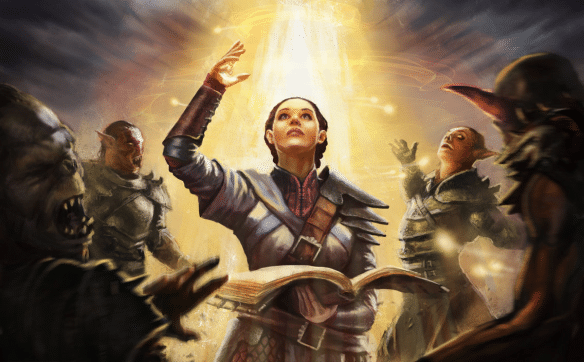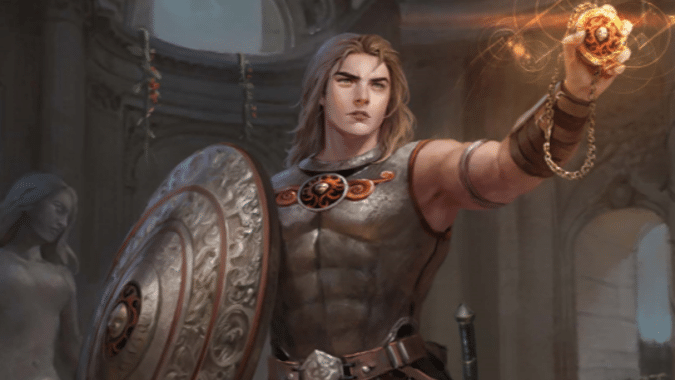Curious about the best Divination wizard 5e build?
Or how good portent actually is?
Then you have come to the right place!
This guide on the divination wizard will provide a step-by-step guide from levels 1-20 on picks I would do to make this class the strongest.
As well as useful insights on the divination wizard that no one else has.
Now, how about we begin this guide on building a Divination wizard for 5e.
Divination Wizard Build Overview
The Divination wizard is the strongest subclass for wizards.
Its level 2 ability alone is so powerful that it puts most other wizard subclasses to shame.
Add the extra utility of the other abilities divination wizards have and you have a class that will have uses in any situation.
Combine this all together and you have a subclass that can appeal to combat, roleplay, utility, or inventors playstyles.
Resources Used
In general, there are two resources I use when doing a subclass build for these articles.
The first one is understanding the 4 playstyles every player falls under and learning what each subclass inherit playstyle is.
If you are unfamiliar with this concept, then I highly suggest reading my articles on playstyle as they go over the information to give you a general understanding of the idea.
Or, if you are looking for an in-depth understanding of playstyles, then I suggest getting my characters, classes, and you, book.
It is only 99 cents but goes over playstyles and some good tricks to build more effective characters tailored to your playstyle.
The second resource I use is my review of the Divination Wizard Guide.
So if you haven’t read that, I highly suggest reading that first as it gives you the general idea and power of the subclass.
While also using the math there to justify the build’s decisions.
Playstyle
As noted in the Divination wizard 5e review, Divination wizards lean more toward a utility or inventor playstyle with their abilities.
All the while sporting solid secondary characteristics that are useful for combat or roleplay playstyles.
As a result, the divination wizard 5e build is best oriented toward supporting the party or trying to make quirky builds powerful.
This means the primary goal of this class will be to make others look better.
This can be accomplished in a few ways, debuffing crucial enemies, giving proper aid in skill checks, or being the best hype man ever.
For the Divination wizard, I lean toward supporting party members in skill checks, but they also are unbelievably strong in debuffing enemies as well.
The Abilities
The Divination wizard has 5 abilities that they unlock from levels 1-20
These are:
- Divination Savant
- Portent
- Expert Divination
- Third Eye
- Greater Portent
Divination Savant will allow you to have more spells in your specialty.
Portent will give you control over any aspect of the game.
While Expert Divination will allow you to recover spell slots much easier.
With Third Eye allows more utility for your character to provide.
All the while, Greater Portent makes your level 2 ability that much stronger.
These abilities will be the essential make-up to any divination wizard build for 5e and as such should be the focus when building.
Step by Step Divination Wizard Build
Level 0
At level 0 you get to choose:
- Race
- Lore
- Background.
In my guide to Divination Wizards, I deemed a gnome would be a great race for a divination wizard playstyle as it gives you a nice boost to Intelligence, advantage on magic saves, and minor illusion if you go forest.
Minor Illusion should not need any explanation but it is a cantrip with tons of use in the right hands.
Meanwhile, for lore, my favorite backstory is a character afraid of the future.
Perhaps one day they saw their village being slaughtered.
So now, every time their vision comes true, they get more confirmation that their village will be lost unless they can find a way to stop it.
Because they seem to care about the village, a noble or sage would be a good background choice.
A sage has great synergy with their abilities and is a solid choice,
That said, I often find a noble’s “position of privilege” to come up very often for people who are big on roleplay.
So I would recommend this one if you like to talk a lot.
Level 1
Now that you have the base of your character setup, it’s time to go over level 1.
At level 1 you learn
- Three cantrips
- 6 spells
- Arcane Recovery
CANTRIPS
For the three cantrips, it is usually good to learn 1 combat, 1 roleplay, and 1 utility. This way you always have a spell for any situation.
Now for the best cantrips, I like to use my 10 best wizard cantrips article as a base as it goes over a lot of benefits to cantrips that most don’t include.
That said, after that, I usually take into account the character’s lore for the final decision.
For combat: I would choose Firebolt, Utility gets Mending, and roleplay cantrip gets Friends.
These were chosen as choices many Sages would probably use quite often in learning the secrets of the village.
SPELLS
As for the 6 spells, it really depends on your playstyle.
That said, since we are assuming a utility playstyle, some of the best spells you can choose are Shield, Detect Magic, find familiar, Grease, and Tasha’s hideous laughter.
Each is a great spell at early levels and has great uses for combat or utility needs.
Shield and absorb elements are great for helping wizards survive, especially if they end up in the front lines
Meanwhile, Grease and Tasha’s hideous laughter does a solid job controlling fights with a boss.
ARCANE RECOVERY
As for Arcane Recovery, this ability lets you regain some of your spell casting powers.
Once per day when you finish a short rest, you can choose expended spell slots to recover that have a combined level equal to or less than half your wizard level (rounded up). And none of the slots can be 6th level or higher.
This is great for regaining uses of expended spells such as Shield and Tasha’s hideous laughter, allowing you to be set up for future scenarios.
Level 2
After level 1, it becomes easier on wizards leveling up.
At level 2, you get your subclass abilities that help you control the board more and learn more divination spells.
These are talked about in detail in my divination wizard review, but the short review is that portent is a powerhouse with being useful to force a fail on saving throw 78-97% of the time.
So, maximizing the abilities’ effectiveness will garnish the best results.
You also get 2 more spells and an additional level 1 spell slot.
Some great ones at this point are ritual spells that have great uses.
These could be something like Comprehend languages or identify for outside combat help, or Alarm or Unseen Servant for setting up great combat rounds.
Level 3
At level 3, you get access to second-level spells.
Hold Person is the premier spell a divination wizard can take.
Meanwhile, you will probably want a spell that holds large versatility inside and outside of combat.
As a result, phantasmal force, Jim’s Glowing Coin, and Suggestion are all solid spells.
With spells like flock of familiars, rope trick, and ray of enfeeblement being solid combat-based choices.
Level 4
Level 4 is where you get the next big perk, Ability Score Improvements or Feats.
The first goal for a wizard is to maximize intelligence and assuming a standard array of 16 intelligence at level 1, you will want to get your intelligence at 18 at this level.

Level 5
At 5th level you get an improvement to proficiency bonus and the most powerful early game spells in the D&D; 3rd level spells.
With this level, you will see a bump to your saving score which will net you a small (1-2%) increase in monsters failing your saves.
While small, it is necessary to keep focusing on improving this score as at level 5 the CR for monsters becomes much higher more quickly.
This means choosing spells that can deal with these threats are going to allow you to shine in combat scenarios.
Fireball and Haste are classic D&D spells wizards will love to have.
That said, these actually are not optimal for a divination wizard.
The reason why is divination wizards do their best at stopping key threats not hurting a lot of people.
So, choose them if you want, but the best ones allow your party to perform better.
This means spells like bestow curse and slow are great for shutting down key opponents.
Both of which have an increased chance of being effective with portent.
Meanwhile, some other good options to consider are Counterspell, Incite Greed, and hypnotic pattern, which portent can interact with in unique ways.
Thus adding another layer to your character’s effectiveness.
Level 6
Level 6 gives you the ability of Expert Divination.
This encourages the use of spells outside combat to be expended so this is a great time to pick up divination spells.
Mind Spike is solid if you want a little more damage capabilities.
With Clairvoyance being one of the best scouting spells in the game.,
Or you can always grab more ritual spells and other spells mentioned earlier that interest you.
Level 7
Level 7 gets you access to level 4 spells.
Polymorph, Dimension Door, and Banishment are classics at this level, but Charm Monster, Otiluke’s Resilient Sphere, and Hallucinatory terrain are great choices inside and outside of combat.
So I would choose from that list as well for a divination wizard.
Level 8
Level 8 has your next ASI improvement for the 5e divination wizard build
Same as level 4, if you are not at 20 intelligence maximize that first.
After you get that at level 20, some feats to look at are Lucky, Elven accuracy, and Metamagic adept.
These all work well with your level 2 abilities and can enhance depending on your choices.
Lucky for more uses of portent.
Elven Accuracy if you have gone a more attacking spell route.
And Metamagic adept to help increase the versatility the classes have.
I would choose the subtle spell and Extended spell for the metamagic adept feat.
Level 9
At this level, you get 5th level spells.
These spells are known for being spells that define an event.
Modify memory, Dominate person, and Scrying become some of your best choices for spells
These can change numerous events your DM throws at you and with portent, can help guarantee your odds of success.
Level 10
At this level, your next big divination wizard ability’ Third Eye
This is a utility-based ability that seeks to help out divination wizard builds by letting them have 4 abilities that they can pick and choose every rest.
The main abilities are the ability to see into the ethereal plane and see invisibility. So at this level, you are probably looking for spells that work in tangent with your new line of sight.
So Arcane Eye and Scrying become your new favorite spells.
Level 11
Now we start getting into the weird spells.
6th level spells are designed to fill in the role of specific builds.
Because of this, identifying what niche spell you want to use at this level becomes important for your effectiveness.
Tenser’s Transformation is a great spell if your wizard prefers a more aggressive playstyle.
While Disintegrate is great for high single target damage and gravity fissure for those wanting to take out swarms of weaker enemies.
Because of portent, however, spells with severe downsides such as Flesh to Stone and Contagion will be great against enemies with legendary resistances.
Level 12
Access to your next ASI or Feat. I suggest choosing from those discussed in level 8.
If not those, then look at some that fit who your character has become at this point.
Level 13
Here we get 7th level spells for the divination wizard build for 5e D&D.
This is your next level of powerful spells designed for high CR combats.
Force cage is probably your best option as once you lock them in there, you can use portent to stop them from teleporting out.
Meanwhile, Plane shift can have some great utility in multi-plane campaigns or works as another form of banishment.
With Finger of Death being a great choice for gaining a permanent follower with a 73.10% chance to have the target fail with your portent ability.
Level 14
Next, we have the best support ability for any divination wizard build; Greater Portent.
This ability changes your 2 portent rolls to three.
Seems simple but is deceptively powerful
With this ability, you increase your character’s portent uses from anywhere from 7% to anywhere as high as 14%.
As a result, this is where the most powerful save or suck spells should be added to your list to work off this ability.
This includes Suggestion, Hold Monster, or spells that you get at level 15.
Level 15
As just mentioned, level 15 spells are where greater portent really shines.
Feeblemind, Reality Break, and Maze are all good options at this level.
Each is one of the best spells for shutting down enemies and so should be considered for your campaign.
Level 16
Wizards don’t have the most amount of feats to choose from, so ones mentioned before are always good.
But to give you some more feats to choose from, Tough for more hitpoints., resilient for common saves you still seem to fail, and War Caster are all solid choices your character will love to see.
I will also add that I did a article on reselient verses war caster and noticed resilient is better for concentration saving throws level 10+ and war caster is better below level 10, so choose resilient over war caster for concentration checks at this level.
Level 17
Next comes the final spells on the list, 9th level spells are your most powerful and the auto-include is Wish.
There has never been a spell that comes close to the power of that spell, but if you want to choose some others, Imprisonment, True Polymorph, and Power Word: Kill are good options for any divination wizard build.
Level 18
Level 18 gives you spell mastery which allows you to cast one level 1 spell and one level 2 spell for free as often as you want.
The best choices are shield and hold person as it works well with the portent and helps you to survive.
While absorb elements and phantasmal force become other choices depending on what you seem to cast more.
Level 19
At this level, you get your final improvement, and really the choice is yours.
You can choose from previous feats or choose whatever suits your character best.
I tend to like the tough feat for the extra hitpoints.
Level 20
Finally, you have made it to level 20.
This gives you the ability signature spells which lets you choose two 3rd level spells you can cast for free each rest.
Despite popular belief, these spells should be popular spells you use outside of combat.
These can include examples such as fly or Clairvoyance as they allow more versatility for the party and saving your spell slots for unique situations you find yourself in.

Multiclassing
Now, for those who only planned on multiclassing, there are two classes that pair the best with a 5e Divination wizard build.
These two classes are bards and sorcerers.
Bard x/ Wizard X
Bards are one of the better choices for a support battle playstyle.
The abilities of the bard are designed to support the party outside and inside combat.
Meanwhile, subclass abilities such as the college of swords, give an increase to combat prowess for their character through many of the fighter’s traits.
As a result, going 2 levels into the divination wizard will see the best results.
2 levels into divination will give you 90% of what makes a divination wizard a divination wizard.
You can also go 6 levels into divination wizard to pick up 3rd level wizard spells but I don’t believe it is worth it as the payoff for the ability is to far away.
Sorcerer X/ Wizard X
The next choice is going sorcerer x levels and wizard x levels.
This kind of multiclass seeks to alter the game state using “meta” knowledge to alter the mechanics of the game.
By using the metamagic ability combined with the portent ability, board states and games can become seriously warped to fit the parties’ needs.
Because of this, your reliance on metamagic abilities is pretty crucial and as such, you should only go 2 levels in the divination wizard for this build.
The reason is your sorcery points and metamagic skills will be what define your skill while portent is there to enhance them.
These two options are great choices if you plan on multiclass and have the most synergy with what most divination wizards in 5e are trying to do.
So i prefer the sorcery build over the bard build.
Divination Wizard Build 5e Conclusion
In conclusion, the divination wizard build is strong and flexible.
Its ability to manipulate rolls combined with the other subclasses’ abilities really allows your character to shine in just about any situation.
Specifically, a utility roll designed to shut down key enemies or buff party members.
Because of this, spells, feats, and racial choices are all designed to enhance the statistics revealed in my review on divination wizards.
I look forward to seeing you use this guide to not only improve your gameplay but to have more fun as well!
If you would like to learn all the tips and tricks I use when building a character, I highly recommend my Players Intro to D&D book, Character, Classes, and You.
Not only is it designed to walk readers through the step-by-step process of making a great and memorable character, but it also goes over which playstyle is best for you and how to implement that in any game you play.
Have a wonderful day and may all your rolls be natural!

